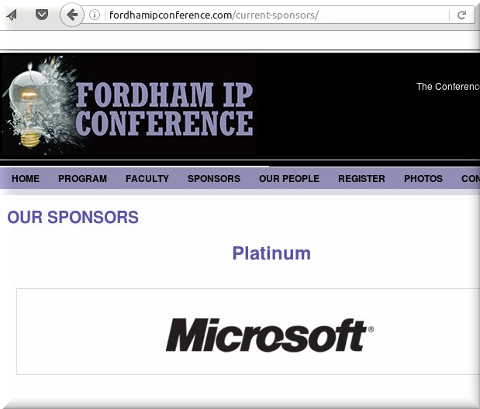

No comment necessary
THE Fordham IP Conference (i.e. stuffed and/or staffed with lawyers, no public interest representatives) has just ended and there was material in it which related to the EPO, the UPC, and software patents in Europe (to be covered separately). Unless you are very wealthy, you're unlikely to have been able to attend and unless you are a patent maximalist, you wouldn't have had a chance to speak there (just listen). It's an echo chamber, a meeting behind closed doors (almost), a conspiracy or a think tank (to put it politely). It's one of several such events (in big and overpriced cities) which are efforts to collectively shape the law and influence policy. Output/reports are like a think tank's bit of "research". Dissenting voices are not allowed, let alone invited to offer input.
"It's one of several such events (in big and overpriced cities) which are efforts to collectively shape the law and influence policy."Right now software patents in Europe are a big deal because the US basically pushes back against such patents, much to the chagrin of patent lawyers who profited from them (usually at the expense of programmers like myself and millions of others).
David Kappos, formerly of USPTO and IBM (now increasingly notorious for aggression with software patents), is acting as though he's above a Supreme ruling or as if SCOTUS is wrong (because of his own financial interests). One must recall what Kappos did after leaving the USPTO (now a patent profiteering person, who is still pushing for software patents).
"David Kappos - not a fan of the Supreme Court's decisions on section 101," says the caption below his face. We will cover the latest developments regarding section 101 some time in the weekend.
According to this outline of the event, composed by a proponent of software patents, Alice upsets Kappos:
In terms of Supreme Court decisions, especially the CLS v Alice Bank decision, David said that it is impossible to make sense of the Supreme Court jurisprudence on section 101. In trying to make sense of section 101, the PTO is trapped by a set of Supreme Court decisions which are incomprehensible. That is has been the architect of PTO's real struggle to get to grips with patentable subject matter. Judge O'Malley agreed that it is difficult to understand what is and is not left in terms of patentable subject matter, but this challenge has led to many more creative arguments from lawyers who try to distinguish their inventions from the realm of a CLS v Alice Bank situation. Sir Robin chimed in stating that in the real world the patent office does issue bad patents - it is inevitable This is because its a one-sided examination process conducted by an examiner who may not have all of the prior art before him or her and who is generally under-resourced. You can see this in Europe where an opposition takes 10-15 years to decide whether a patent is valid. This is a broken system. The America Invents Act, to Sir Robin, looks great in comparison as it provides a quicker, more efficient regime to address validity. It also provides certainty, which is hugely important.
David agreed about the inevitably of some patents being wrongly granted. In particular, this is an issue when an examiner is being asked whether an invention is abstract - that very question is entirely subjective and, as Sir Robin noted, in such a situation of course wrongly granted patents will be inevitable.
David Kappos who, (as Hansen says) everyone knows, has 10 priorities for whoever is the next US president:
Innovation = action, progress, leadership US must resume its role as world leader in innovation Federal government will lead in championing and rewarding innovation Government needs to recognise innovators need incentives Patent system is our system for incentivising innovation - we need a strong patent system Administration should not shy away from leadership in tuning patent system, from a position of strength Curtail abuses, but with the view that the benefits of patents far outweigh occasional misuses Patent system must take precedence in conflicts with other systems of law, especially antitrust law We will favour creation of new technologies and dynamic competition not protecting status quo (as antitrust law does) Patent system is enshrined in the constitution because innovation is about exalting what's next not what's now.
In the Q&A, he says he feels the current (Obama) administration, in its second term, has not been as supportive of patents as it was before or should be.